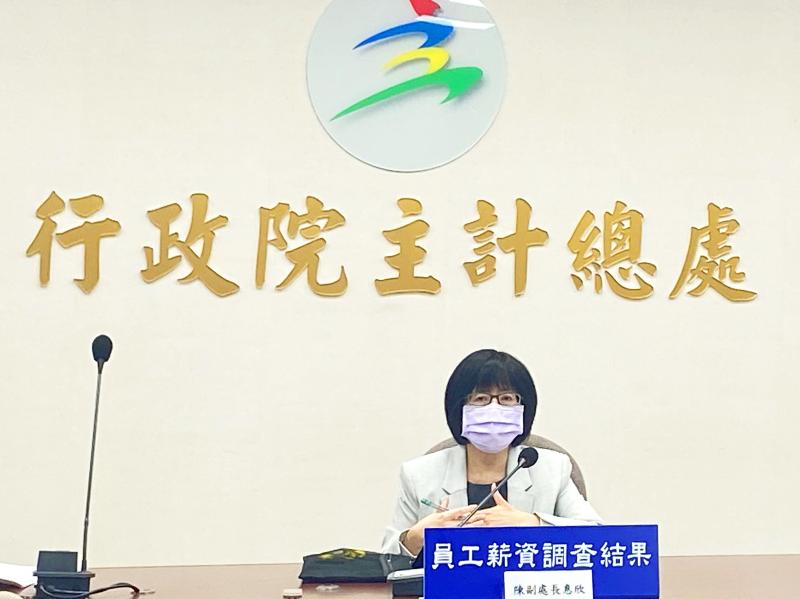The number of employees in the industrial and service sectors in August was up 0.36 percent month-on-month, as the job market began recovering from a local COVID-19 outbreak, but it has yet to fully recover, the Directorate-General of Budget, Accounting and Statistics (DGBAS) said yesterday.
The data showed the addition of about 30,000 jobs in August that raised the overall number of employees to 8.09 million, as businesses in the service sector resumed normal operations, DGBAS Deputy Director Chen Hui-hsin (陳惠欣) told a news conference in Taipei.
Lower numbers of local COVID-19 infections enabled hospitality, recreational and non-school educational facilities to reopen their businesses at reduced capacity, Chen said.

Photo: Clare Cheng, Taipei Times
“The situation is improving, though still lagging behind what it was prior to the implementation of the level 3 COVID-19 alert in May,” she said.
Hotels and restaurants added about 13,000 more employees to their payrolls, while non-school educational, social welfare and health-related facilities each hired about 4,000 more workers, she added.
The accession rate — the number of new employees added to payrolls — picked up 0.24 percentage points to 3.04 percent, while the exit rate edged up 0.41 percentage points to 2.68 percent, the report showed.
The government has maintained some restrictions, such as keeping night clubs, dance halls and entertainment venues where people cannot maintain social distancing closed, despite only two local infections being reported this month.
Meanwhile, an uptick in wages also lent support to a recovery in the job market.
The nation’s average take-home pay grew 0.76 percent to NT$43,227 (US$1,536) in August, the report showed.
The pace of the increase is the fastest since 2008, Chen said, after hotels and restaurants raised employees’ compensation by 5.42 percent, leisure and entertainment businesses hiked wages by 5 percent, and other service providers raised wages by 3.31 percent on average.
However, total monthly wages including overtime and commission-based income declined 7.58 percent month-on-month to NT$51,169 in August after electronic component suppliers issued mid-year bonuses in July, pushing up the comparison base, the report showed.
Manufacturers of notebook computers and optical devices chose to pay mid-year bonuses in August, increasing their employees’ monthly wages by 19.06 percent, it showed.
In the first eight months of the year, average take-home pay in the nation increased 1.78 percent year-on-year to NT$42,990, while total compensation grew 2.41 percent to NT$57,579, the report showed.
The real gain in total wages stood at 0.15 percent after factoring in inflation, it showed.

Among the rows of vibrators, rubber torsos and leather harnesses at a Chinese sex toys exhibition in Shanghai this weekend, the beginnings of an artificial intelligence (AI)-driven shift in the industry quietly pulsed. China manufactures about 70 percent of the world’s sex toys, most of it the “hardware” on display at the fair — whether that be technicolor tentacled dildos or hyper-realistic personalized silicone dolls. Yet smart toys have been rising in popularity for some time. Many major European and US brands already offer tech-enhanced products that can enable long-distance love, monitor well-being and even bring people one step closer to

Malaysia’s leader yesterday announced plans to build a massive semiconductor design park, aiming to boost the Southeast Asian nation’s role in the global chip industry. A prominent player in the semiconductor industry for decades, Malaysia accounts for an estimated 13 percent of global back-end manufacturing, according to German tech giant Bosch. Now it wants to go beyond production and emerge as a chip design powerhouse too, Malaysian Prime Minister Anwar Ibrahim said. “I am pleased to announce the largest IC (integrated circuit) Design Park in Southeast Asia, that will house world-class anchor tenants and collaborate with global companies such as Arm [Holdings PLC],”

Sales in the retail, and food and beverage sectors last month continued to rise, increasing 0.7 percent and 13.6 percent respectively from a year earlier, setting record highs for the month of March, the Ministry of Economic Affairs said yesterday. Sales in the wholesale sector also grew last month by 4.6 annually, mainly due to the business opportunities for emerging applications related to artificial intelligence (AI) and high-performance computing technologies, the ministry said in a report. The ministry forecast that retail, and food and beverage sales this month would retain their growth momentum as the former would benefit from Tomb Sweeping Day

Thousands of parents in Singapore are furious after a Cordlife Group Ltd (康盛人生集團), a major operator of cord blood banks in Asia, irreparably damaged their children’s samples through improper handling, with some now pursuing legal action. The ongoing case, one of the worst to hit the largely untested industry, has renewed concerns over companies marketing themselves to anxious parents with mostly unproven assurances. This has implications across the region, given Cordlife’s operations in Hong Kong, Macau, Indonesia, the Philippines and India. The parents paid for years to have their infants’ cord blood stored, with the understanding that the stem cells they contained